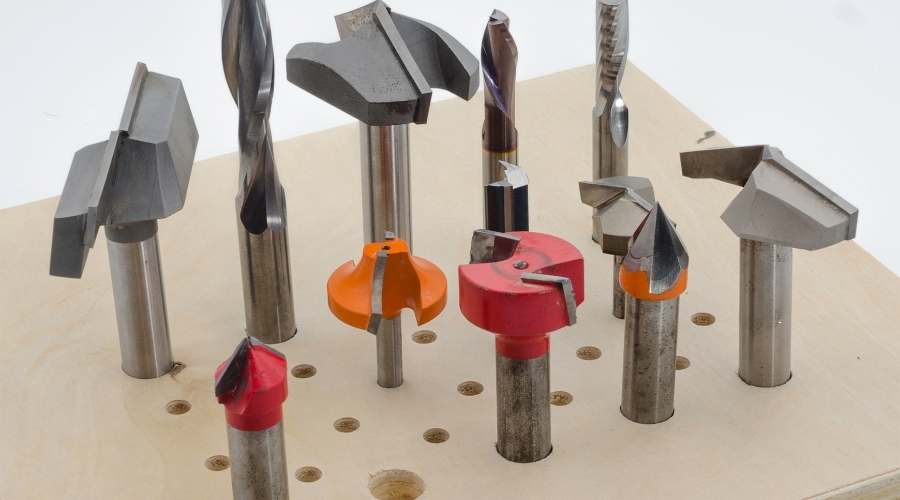CNC Machining is a valuable process that can produce all kinds of products and parts. Each component of the CNC machine is helpful, but none are more vital than the router bit.
And a question we hear often is:
How Long Do CNC Router Bits Last?
As with all tools, CNC router bits can wear down with routine use. The life of a router bit depends on various factors, such as the materials you’re cutting and how often you’re using the machine. However, the average lifespan is about two years for most bits.
If you want to get the most out of your CNC router bit, you need to understand how it works and the tips and tricks for keeping it in good shape. Let’s break down each of these elements.
What is a CNC Router Bit?
A CNC router is a machine built to cut through various materials, such as metal, fiberglass, PVC, wood, and more. The router bit is the cutting end of the spindle. You can find a wide array of bits to achieve different results. When choosing a bit, you need to pay attention to these elements:
- Material – What are you cutting and shaping? You need a hard enough bit to get through it smoothly.
- Design – Is your design intricate, or do you need to make larger holes and shapes? Your bit size should reflect the design accordingly.
- Edges – You can choose a one or two-edged bit, depending on your needs.
Why Does a CNC Router Bit Wear Out?
There are a few reasons why these bits will wear down over time, such as:
- Improper Matching – Router bits are rated for specific materials. So, if you use a bit on a harder surface than it’s rated for, you’ll wear the edges down much faster.
- Mis-Calibrating – When setting up a new router bit, it’s crucial to calibrate it correctly. Otherwise, one side of the bit will wear down quicker than the others, causing uneven edges.
- Standard Wear and Tear – Even if you take care of your CNC machine and bits, they’ll wear down eventually. The more often you use the piece, the faster it will become dull and useless.
Signs of a Worn CNC Router Bit
Depending on the type of work you do, a worn bit can lead to significant problems and delays in manufacturing. So, recognizing the signs of a dull bit can help you mitigate these issues and prevent them from occurring in the first place. Here are the top ways to tell if a router bit is past its prime:
- Abnormal Sounds – After working with a bit for a while, you should be familiar with how it sounds as it’s working. So, if it starts to sound different, the problem could be the bit itself. Examples of abnormal sounds can include shrieking, whistling, or grinding.
- Rough Cut Edges – Normally, a CNC machine leaves relatively smooth edges that don’t have splinters or burrs. So, if you notice these elements after making your cuts, the culprit is likely a worn router bit.
- Excessive RPM – As a router bit gets dull, it can’t deliver the same results as quickly. So, the machine has to work harder to compensate. In this case, you might notice that the CNC equipment is running at a higher RPM than average. While there are other reasons for this problem, one of them could be a dull or broken bit.
- Excessive Vibration – Typically, bits don’t wear down evenly. Instead, one side will erode faster than the other. When that happens, it could cause an imbalance within the machine, creating small vibrations. You’ll notice this problem if you turn the device on and it starts vibrating a lot more than normal.
- Visual Inspection – The best time to discover a worn router bit is before installing it in your CNC machine. Be sure to inspect all bits for signs of wear, including uneven or dull edges.
How Long Do CNC Router Bits Last?
As we mentioned, quite a few factors can affect the lifespan of a CNC router bit. However, the average time frame is about two years. Here’s a quick rundown of how the different types of material you cut can impact the life of your bit.
- Wood – What matters most is the type of wood you’re cutting – hard or soft. As a rule, you use lower RPMs for hardwood, so the bit won’t spin as fast. As long as the piece is rated for hardwood, it should last a long time. However, if you’re switching between hard and softwood with the same bit, you’ll reduce its lifespan. Related: Best router bits for plywood.
- Metal – No matter what kind of bit you’re using, it will wear down faster when cutting metal. This problem is especially true if you’re working on thicker pieces, not sheet metal. You should plan to change bits annually overall. Related: Best router bits for aluminum.
- Plastic – Plastic can also wear down router bits quickly because of its chemical composition. Unlike wood and metal, plastic can melt from friction. So, if your RPMs are too high, the surface will go from hard to soft pretty quickly. As a rule, router bits do best when cutting materials with the same consistency. Changing the hardness of the material can cause uneven wear.
Tips for Extending the Life of a CNC Router Bit
Although you can’t use the same bit forever, you can take care of the piece so that it lasts as long as possible. Here are some top tips on making your router bit stay in pristine condition.
- Use Thicker Shanks – Although you can buy 1/4-inch shanks, it’s better to use 1/2-inch models instead. The benefit is less vibration and more stability while cutting. Thinner shanks can wobble slightly, creating uneven surface wear.
- Sharpen Your Bits Regularly – The more often you use a bit, the duller it will get. Sharpening it can extend its lifespan significantly.
- Don’t Overclock Your Machine – High RPMs create friction, which can ruin both the material and the router bit. As the piece heats up, the metal warps and bends slightly, leading to a duller edge. Always stay within the recommended RPM settings.
- Remove Waste As You Work – Connecting your CNC machine to a vacuum system helps alleviate two issues. First, you don’t have to worry about debris getting caught in the bit and causing nicks. Second, you don’t have to spend as much time cleaning up afterward.
- Install Your Bits Correctly – Always follow manufacturer guidelines when installing and changing bits. Although doing this can slow down production, it will keep your pieces in better condition for longer.
Learn more about tool life for your CNC and how to optimize it.
Since router bits are the lifeblood of your CNC machine, you need to take care of them. Now that you have more information on how long they last and how to protect them, you should be able to maximize productivity. Happy machining!



